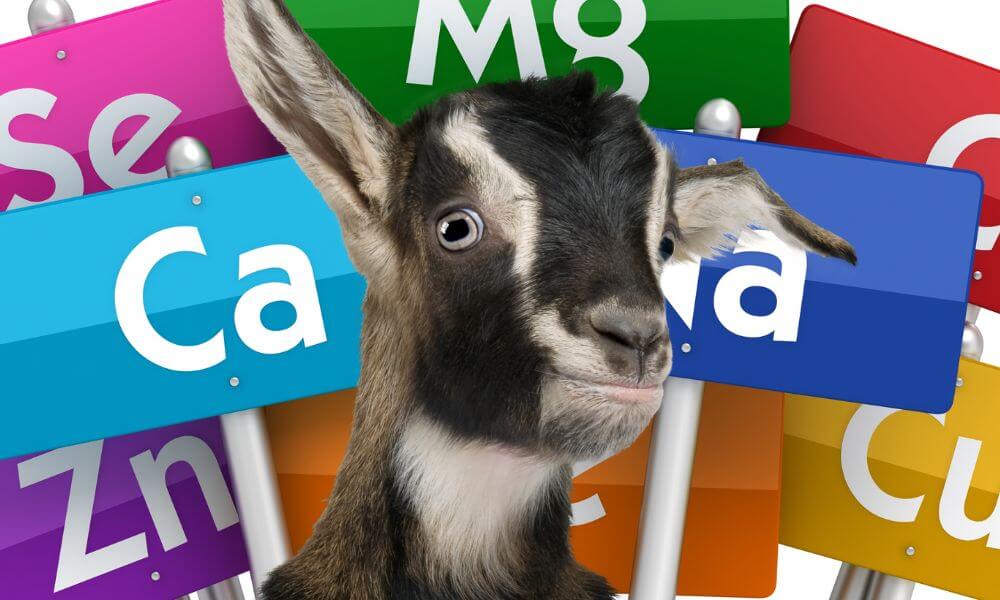While this may seem like a lot of minerals to keep track of, as I said, they will get most of them through only a handful of sources.
As long as they have access to good forage, they will be unlikely to be deficient in any of these minerals.
Providing mineral supplements is always helpful, though.

Do goats need minerals daily?
Yes, they do.
The best way to provide a complete goat diet is to get them on a pasture which they can roam for a good variety of high-quality forage.
As long as they have a plentiful choice of plants and other things like tree bark, berries, and even flowers, they will get the vast majority of all the minerals they need.
Magnesium metabolizes carbohydrates and fat, as well as being an important part of enzyme systems.
They can generally get all the magnesium they need just from grass.
Potassium is rich in most forage, so you should have no problems with that.
Potassium corrects fluid balance in cells and plays other roles in metabolism.
Iron, too, is available in a good pasture, so deficiencies should be rare in a goat with access to good forage.
Iron plays an important part in cellular respiration and moving oxygen through the body.
Copper deficiency is a very common problem for goats, leading to bone fragility and fractures in long bones.
Most plants have good amounts of copper in them, so, again, with good quality forage, they should get most of the copper they need.
But in order for your goat to be as happy and healthy as possible, they are probably going to need some supplements in their diet.
Do goats need mineral supplements?
Yes, they do, generally speaking.
Goats in the wild are able to roam large areas to find the minerals they need, but you will need to provide them to your goats.
Mainly due to the goat’s increased need for copper in its diet, you should always get specifically formulated goat mineral supplements.
These can be mixed with their feed or simply put somewhere in a feeding trough by themselves.
Calcium, too, often is insufficient in their diet without a supplement.
This, in addition to good forage, usually meets their needs for calcium.
Mineral supplements are not really the main important thing in providing the minerals your goat needs, though—let’s look at the importance of a salt block in your goat’s diet.
Should goats have a salt block?
It need not necessarily be a block—as I’ll get into, these blocks can often cause issues for goats, who do not have rough tongues, like cows.
They often chip their teeth trying to break the blocks.
So, what you can do instead is simply provide them with salt mixtures formulated for goats.
Salt mixtures usually contain all the final minerals your goats need that we have looked at.
Iodine, zinc and selenium, are all found in quality salt mixtures, and so represent your best bet of topping off your goat’s diet with the final remaining minerals that it needs.
Should goats have a mineral block?
The terms become a bit muddled here, as mineral blocks and salt blocks are not always the same thing.
In any case, again, a block is generally not the best idea for a goat.
They can hurt themselves trying to break off chunks of minerals.
They do much better with mineral supplements, which typically come in powder form.
So, while goats certainly should have mineral supplements, a block is not your best bet.
Further, since they are not usually designed for goats, they may be for an animal with much different mineral needs—like sheep.
What are signs of copper deficiency in goats?
As I mentioned, copper deficiency is one of the biggest problems for goats.
There are some important signs to look out for, such as anemia.
They will appear tired, weak, and fatigued, with little energy to do anything.
It will also affect their coat.
It will begin to look bleached and rough, even matted.
Keep an eye on the health of their coat for signs of copper deficiency—this is one of the first things you’ll notice.
They will also have more explicit symptoms, the longer it goes on.
This will include diarrhea and ultimately weight loss, before finally experiencing poor coordination and even paralysis in the rear legs.
Any of these could be a sign of copper deficiency.
So, with a good, balanced diet of forage, fruits and vegetables, and supplemented with mineral and salt blocks, your goat should really get all the minerals it needs.
You don’t need to carefully plan every single individual mineral that your goat needs.
Just be sure that they are getting sufficient balance, and they will have no problem with any mineral deficiencies.
